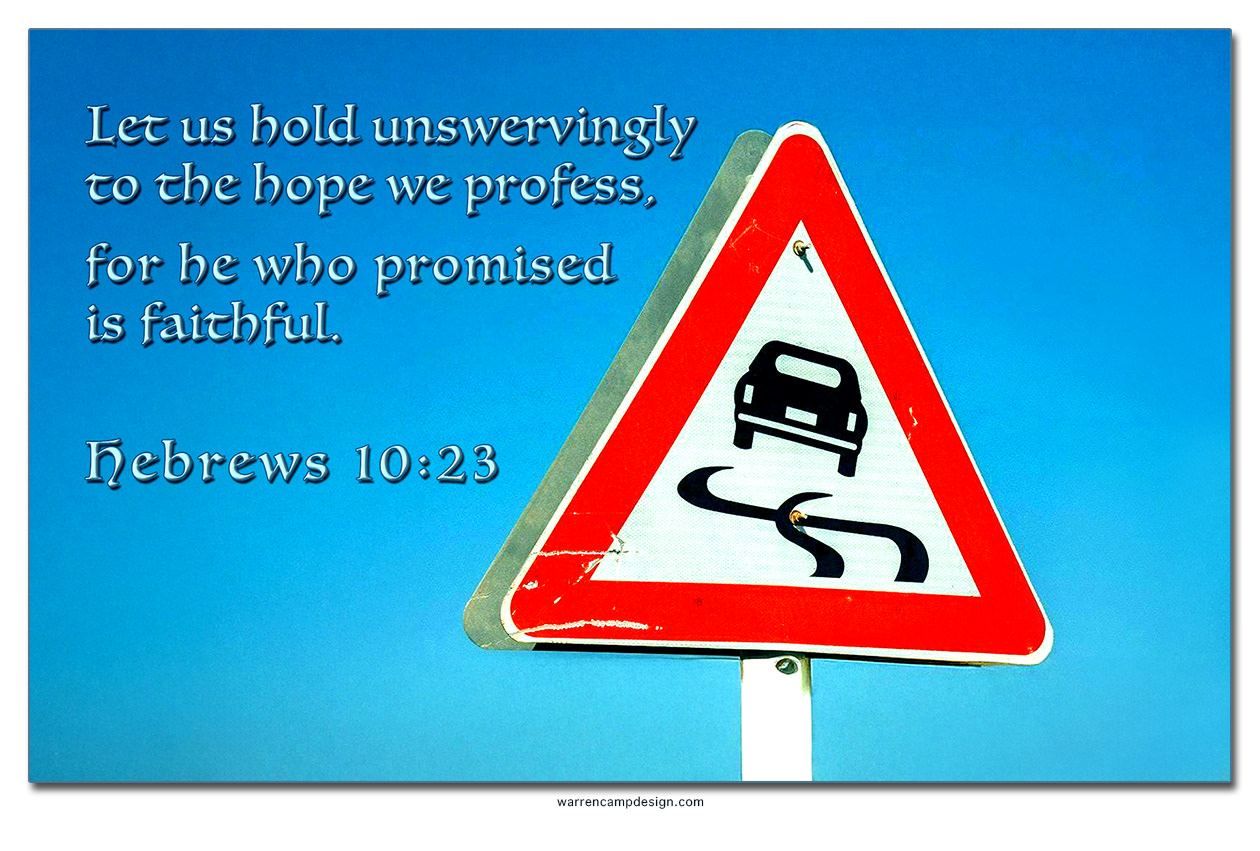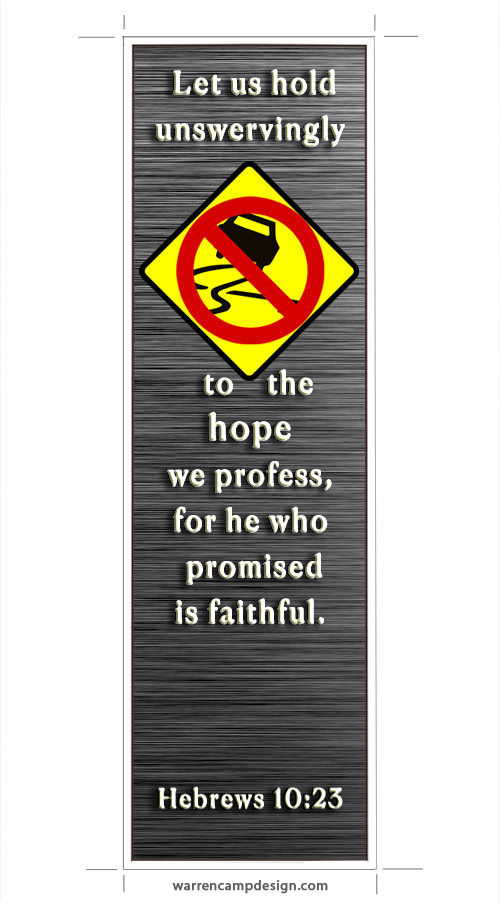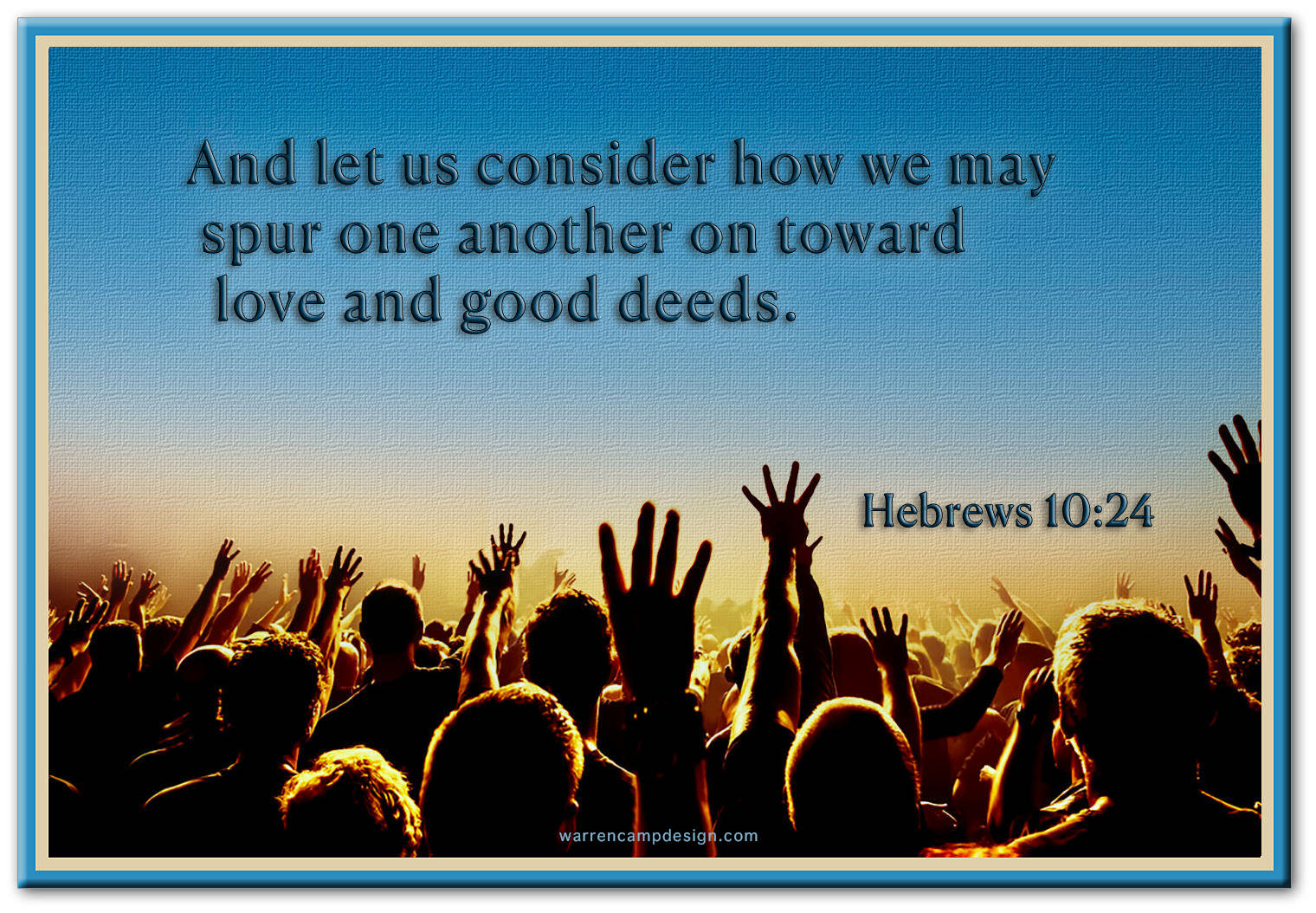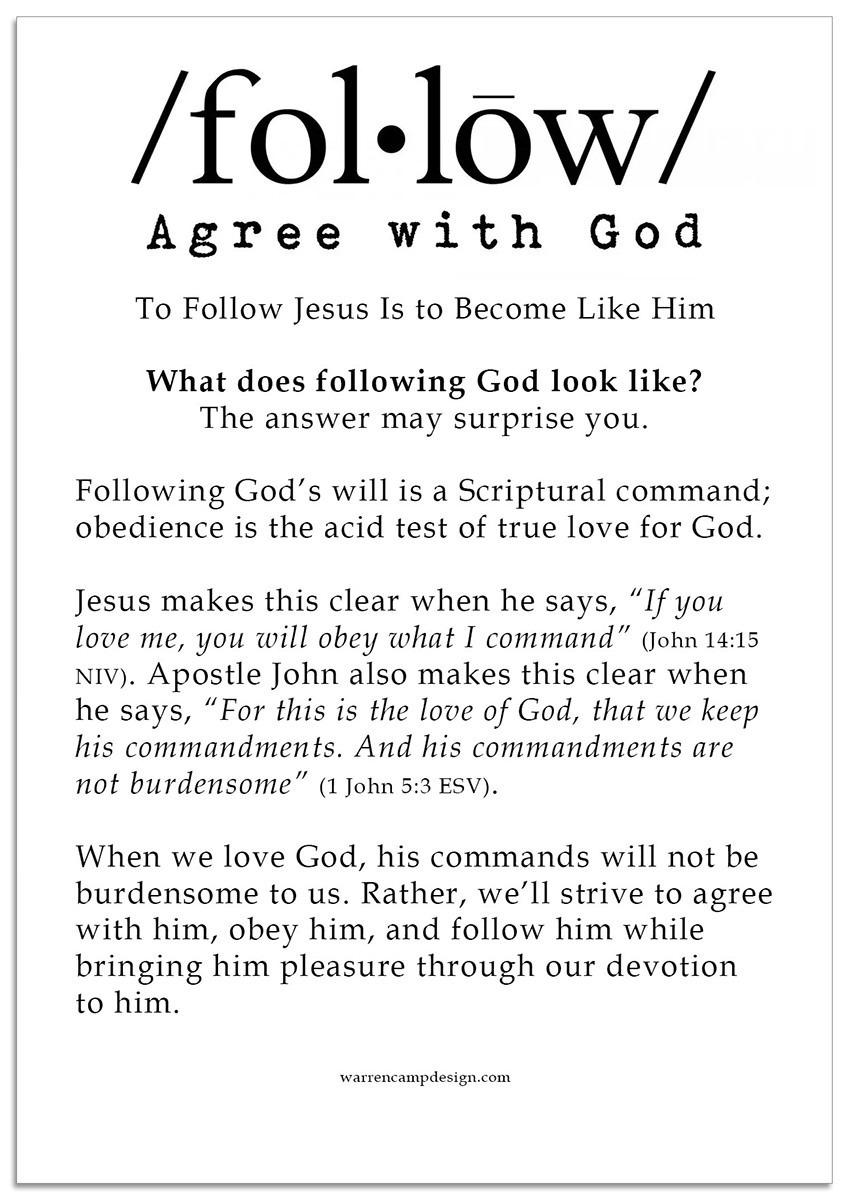Hebrews 10:19–25 . . .
“Let Us, Let Us, Let Us”
In Warren's previous commentary that helped reveal the meaning of 10:1–18, we realized that the superior once-for-all sacrifice of Christ enables every believer to enter into God's presence so that all who follow Jesus will enjoy a superior relationship with him. The author urged his audience to take advantage of that life-changing privilege and have an enduring faith in God while encouraging other believers to do similarly.
Today’s text is an encouraging link uniting two major sections of “Hebrews.” Earlier verses completed a long, detailed explanation of why the new covenant is superior to the old covenant. This section is meant to inspire Christians to be courageous, confident, and proud at living out their faith. It perhaps represents the author’s sternest warning in this epistle about the danger of believers losing their faith.
This letter’s original audience was the early church’s persecuted Jewish Christians. They were under pressure to return to a more popular, easier religion: Judaism. The entire letter was intended to motivate these believers to be more diligent, more confident, and more proactive in their faith that Jesus Christ, not the old covenant priesthood, is God’s ultimate plan for mankind’s salvation. See in today’s text each of the author’s three essential “Let us . . .” commands.
Let Us Not Throw It All Away (10:19–22)
For our first “Let us” command, our author might have personally expressed himself like this: So, friends, we can now — without hesitation — walk right up to God, inside “the Holy Place.” Jesus has cleared the way to it by the blood of his sacrifice, acting as our priest before God. The “curtain” of God’s presence is his body. So let’s do it — full of belief, confident that we’re presentable inside and out. Let us keep a firm grip on the promises that keep us going.
A Call to Persevere in Faith
19Therefore, brothers and sisters, since we have confidence to enter the Most Holy Place by the blood of Jesus, 20by a new and living way opened for us through the curtain, that is, his body, 21and since we have a great priest over the house of God, 22let us draw near to God with a sincere heart and with the full assurance that faith brings, having our hearts sprinkled to cleanse us from a guilty conscience and having our bodies washed with pure water (10:19–22).
The reference here to “brothers and sisters” points to the fact that this letter was written to saved Christians. They needed to realize that one of the old covenant’s most striking features was the curtain or veil that separated holy places, preventing people from entering them. Behind the rear-most curtain was the tabernacle’s holiest of all rooms; only the high priest could enter it, once a year, bringing with him the stipulated sacrifice for sin (9:6–7). This curtain signified an obvious separation between God and man (9:8). Christ’s sacrifice on our behalf, however, removes this barrier (9:11–14). This was most dramatically symbolized at Jesus’ crucifixion, when this same temple curtain was torn from top to bottom (Matthew 27:50–51). Instead of coming back to an earthly Holy of Holies where only a select few could ever enter, God Almighty instead sent his only Son to open the way for all of is people to meet with him inside the heavenly Holy of Holies.
Today’s opening verses itemize the process of our entering “the Most Holy Place.” We’re our own priests; there’s no room for someone else to play that role for us. Christ is the high priest who made the requisite blood sacrifice once, for all. The priests and observant Jews of the day would likely have found v. 19 to have been quite inflammatory: Commoners could enter the “Most Holy Place.” Believers, then, were unable to go where only Aaronic priests had previously been permitted. But today, we believers are able to enter the holy places by the blood of Jesus (vv. 19–21). His death made accessible for people what wasn’t previously possible. Clearly we now have access into the heavenly throne room.
Do you see the analogy that the author made in the phrase “through the curtain, that is, his body”? Focus on the curtain that stood between God and man while also separating man from the body of Jesus. That curtain became “torn,” as did Jesus’ body, indicating that believers can now approach God boldly. “The curtain” that separated the Holy Place from the Holy of Holies can now be passed through by believers, through “his body” (v. 20), after Jesus’ death on the cross. He is, therefore, our “great priest” (v. 21). Since he brings a superior covenant (7:18; 8:6), Christians have every reason to be confident and courageous in living out their faith.
Note: Just as the priests were consecrated through blood sprinkling and washing (Leviticus 8:10–15), so are believers consecrated and washed in Christ Jesus (today’s v. 22); just as our “hearts” are sprinkled, our “bodies” are washed with “pure water” (Greek: katharos); and just as there was physical washing in Lev. 8, v. 22 identifies a true spiritual washing as a result of Jesus’ sacrifice. The old covenant placed great emphasis on ceremonial cleanliness. Priests and other worshipers had to follow certain washing rituals in order to communicate with God. Here we’re shown that, even though he forgives our sins, we ought to make our own effort to be “washed” when we “draw near to God.”
Our author once again exhorts his “brothers and sisters” to sincerely and boldly hold firm to “the full assurance that faith brings” (v. 22). In the next verse, his commentary encourages all who read it to hold on to the confession of our hope, without wavering.
Let Us Hold Unswervingly to Remaining Hopeful (v. 23)
The second “Let us” command urges believers to “hold unswervingly” by relying on Christ’s finished work on the cross. Let us keep a firm grip on the promises that keep us going. After all, our Lord God is most faithful. He always keeps his word.
5Let us hold unswervingly to the hope we profess, for he who promised is faithful (10:23).
For the persecuted Jewish-Christian readers, discouragement caused them to waver from the truth. A renewed and persevering confidence in Jesus’ greatness and new covenant was what they needed to enable them to retain strong faith. Christians, then and today, are called herein to not make the mistake of succumbing to fear and doubt. Instead, we must welcome and wholeheartedly profess our confidence in Christ and his salvation gift, while acting most accordingly. Thankfully, we can stand strong in our faith because we have confidence that “he who promised is faithful.” [Note: In this letter, the author has repeated the word “confidence” five times in the NIV, as shown on this list.]
Looking closely at the phrase “hold unswervingly,” according to Rick Renner, in Sparkling Gems from the Greek, it’s taken from the Greek word katecho, a compound of kata and echo. Kata carries the idea of something that comes downward in an overpowering manner. The word echo simply means the possessive “I have.” When kata and echo are compounded into katecho, it literally means to embrace something tightly, taking control of it, dominating it, even sitting on it so it doesn’t slip away! [1]
In the Greek context, Renner adds, “Verse 23 could be interpreted to mean: Let us come into agreement with God and begin to speak what he says, tightly wrapping our arms around the promise we are confessing — embracing it with all our might, holding tightly to it, rejecting all attempts of anyone who tries to steal it from us, not allowing ourselves to be fickle in our commitment, but determined to be inflexible and unmoving from that which we believe and confess.”[2]
Let Us Pursue Our Encouragement of God’s People (v. 24–25)
Looking carefully at vv. 24–25’s message, see in this third “Let us” command how inventive we’re to be at encouraging love while helping people, not avoiding fellowship as some do. Let us instead “spur one another on,” especially as we see the big Day approaching.
24And let us consider how we may spur one another on toward love and good deeds, 25not giving up meeting together, as some are in the habit of doing, but encouraging one another — and all the more as you see the Day approaching (10:24–25).
“Hebrews” strives to encourage Christians not to lose their faith; discouragement caused them to avoid fellowship at the very time they needed it most. When today’s believers feel the pressure of persecution and fear, the essential response is to hold fast to the truth and not give up. Our faith is crucial to holding fast to the truth. After all, that’s one big reason why our author repetitively warned readers not to be lazy or careless about their spiritual growth but to make every effort to not drift away. These two verses encourage positive Christian fellowship among believers; forsaking fellowship surely leads to discouragement. The text emphasizes the responsibility Christians have to meet regularly so they can “spur one another on” and “encourage one another.”
The Greek for “spur one another on” (paraxusmos) is insightful. The word para means alongside, carrying the idea of being close. The second part of that word is the Greek xusmos, meaning to sharpen something, such as a knife; it indicates a very sharp situation. The compound word paraxusmos describes someone who’s come alongside of someone else for the purpose of prodding and compelling that person to do something. The word tells us that our relationships with other believers should incite us all to become better, stronger, and bolder in our Lord.
We’re also urged to consider other believers; our care and support of them is extremely important and very relevant to our spiritual maturity (3:13). For example, when we come upon difficult times filled with fear or doubt, instead of reacting negatively to them, we should strive to “hold unswervingly to the hope we profess” while maintaining a confident faith. With such hope and confident faith, we’re obliged to encourage fellow believers to do similarly by not simply believing but getting together with and encouraging them, actively promoting “love and good deeds” (v. 24). Christians are to look for opportunities to inspire others to love and do good works.
So when God urges us to “consider how we may spur one another on,” he wants us to be so concerned about each other’s welfare that we take time to regularly and seriously contemplate how we might encourage one another. When our care for others is genuine, we should make it our aim to think through from beginning to end the question of how we might become a greater source of blessing and strength for others. Verse 25 could be translated: When you or others are feeling down, that isn’t the time to stay away from other believers, as some are in the habit of doing.
It’s our responsibility to build and maintain personal relationships with other believers. To live out the faith we proclaim, we’re called on to “hold fast” to the truth and to our faith in God, through our own spiritual maturity. Individually, our spiritual growth in faith relies significantly on our engaged fellowship with fellow Christians. While such association is necessary for our personal discipleship, it also enables us to effectively support and meet one another’s needs while encouraging and inspiring them in their faith.
What might “the Day approaching” refer to? The author likely referred to a unique day that everyone anticipated. Putting this writing into context, we can see two presumed meanings: (1) Many theologians and Bible version interpreters who capitalize “Day” believe that it refers to the day in which Christ will return to earth, a Day that’s drawing close; (2) other theologians believe that “he day” is none other than the day of judgment, perhaps it’s (a) the approaching day of judgment that God would bring upon the city of Jerusalem or, (b) for today’s Christians, that final day of judgment that will come upon all nations. No matter your interpretation of what “the Day” means, as the day of Jesus’ return draws nearer, we should be much more committed to meeting with God’s people and “encouraging one another.”
Note the author’s intentional inclusion of the Pauline triad of Christian virtues: faith (v. 22), hope (v. 23), and love (v. 24). We ought to know if our relationship with Christ has really transformed our lives. The best way to realize that is measured by our performances of all three practices for everyone to see. Thus, “brothers and sisters” gather together in worship and fellowship to encourage one another (v. 25). In this situation, faithful assurance is performed by the sprinkling and washing with baptismal water (v. 22); the hope Christians share in fulfilled promises is performed by our confessions of faith (v. 23); and the love of God we practice is performed by “good deeds” (v. 24).
Concluding Comments and Questions
Today, every believer has instant access to Father God, through his Son Jesus. We need not adhere to religious rites before coming to him in prayer. Wherever we are, we can call on him for forgiveness and help. As our author has reminded us in previous passages, old covenant law prescribed exactly who could approach the Lord and how it was to be done.
The tabernacle was divided into a courtyard, an inner chamber called the Holy Place, and the innermost chamber called the Holy of Holies. Any Israelite could enter the tabernacle to pray to God and/or bring a sacrificial offering, but only priests could perform the required animal sacrifices on the Holy Place’s altar. And the Holy of Holies was entered only once a year and only by the high priest to offer blood for his sins and the nation’s sins.
But when Jesus died on Calvary’s cross, the curtain in front of the Holy of Holies was torn from top to bottom (Matt. 27:50–51), enabling Father God to open a new and living way to approach him: through his Son’s blood. When we trust in Christ and his sacrifice on our behalf, he cleanses us from all sins, inviting us to draw near to him (v. 22).
The new and living way to our heavenly Father is certainly open. So, have you begun to draw near to him? Even those of us who’ve trusted the Lord for salvation may not be taking advantage of his invitation to come even closer to him. In James 4:8 NKJV, the author makes a promise that every believer should claim: “Draw near to God and he will draw near to you.”
An essential element of having a right relationship with someone is a person’s dependability. Would a dependable Christian friend who spots a sin in your life challenge you to repent? You bet! That should be a believer’s responsibility and priority. Good relationships with righteous people build up each other, thereby helping believers fulfill God’s plan for their lives. The finest relationships are between people who want to see each other succeed in faith and, therefore, “spur one another on toward love and good deeds” (v. 24). In other words, our best friends are those who love us as we are and never stop pointing us to the Lord while challenging us to aim for excellence.
- Q. 1 What does “the Day approaching” mean to you?
- Q. 2 How could you be more prepared for that day’s arrival?
Hebrews 10:19–25
New International Version (NIV) or view it in a different version by clicking here.
— Listen to chapter 10, narrated by Max McLean.







